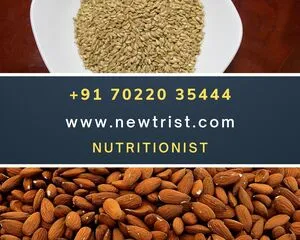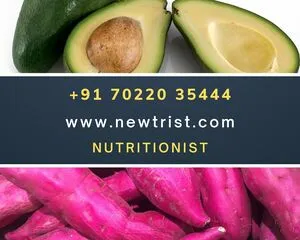The best diet plan for Menopause includes low-fat dairy products, nuts and seeds, whole grains, millets, chickpeas, soybeans, seasonal fruits, leafy vegetables, eggs, lean meats, and fish.
- Early morning drink @ 6:30 am: Ginseng tea
- Breakfast @ 9 am: Oats idly with mint chutney
- Mid-morning meal @ 11 am: Greek yogurt with apples and bananas
- Lunch @ 1 pm: Edgy Veggie Wraps
- Evening snack @ 4 pm: Home-made granola bars
- Dinner @ 7 pm: Multigrain dosa with soya chunks curry
Best Nutritionist in Bangalore
Consult 19-year-experienced Chief Nutritionist Vasanthi, in person at HSR, Koramangala, Bellandur, Haralur, Electronic city, or online across India.

Table of Contents
What is menopause?
Menopause brings many changes in women, including hormonal, physical, and mental instability. During menopause, women are at risk of higher cholesterol levels due to low secretion of estrogen levels and deposition of visceral fat around the organs of the body.
Menopause is characterized by a drop in the reproductive hormones between the age of 40 – 50. Menopause alerts you of a missed menstrual cycle for 12 months or more.
- Menopause is a natural change that is observed in every healthy individual.
- Hysterectomy is one of the causes of the onset of menopause. Abnormalities in the uterus can lead to surgical removal of the ovaries in women.
- When there is a termination in the production of eggs in the ovaries, the menopausal period begins. There will be a drastic fluctuation in the hormonal level during this period.
Menopause symptoms at age 40
Sleeplessness, vaginal dryness, and hot flashes may be some of the warning symptoms of menopause.
- A change in physical and emotional well-being and energy levels are the changes that indicate the termination of your menstrual cycles. The process of ovulation no longer happens after the menopausal stage starts.
- Women are more prone to gain a lot of weight due to the hormonal changes that take place after menopause. Depletion of calcium and other essential minerals can make the body weak and healthy functions of the body may be disrupted.
- Shifting to healthier eating habits and routine physical exercises can keep you fit and free from any illnesses.
- Some women may experience incontinence, a loss of control over the bladder. A sudden urge to urinate or urine leakage during sneezing, laughing, or exercising can be one of the symptoms of menopause.
Stages of Menopause
Menopause begins with irregular periods, disturbance in sleeping patterns, vaginal dryness, anxiety, and depression. There are 3 stages in the menopausal period
- Perimenopause
- Menopause
- Postmenopause
The Perimenopausal period lasts for about 10 years before menopause. The menstrual cycle becomes irregular due to the drop in estrogen levels. The post-menopausal period starts after menopause and continues till the end of life.
Menopause Food Plan
Menopause can create havoc on the mind and body with a drop in estrogen levels. A woman can overcome the problems faced during menopause by shifting to a healthier lifestyle.
Depletion of calcium and iron is more during this period which may lead to osteoporosis and anemia. A healthy diet helps in restoring the essential nutrients needed for the proper functioning of the body.
A nutritious and healthy diet not only prevents unnecessary weight gain but also lowers the difficulties faced during menopause. When there is a disturbance in the hormonal levels, the resources start to deplete from the bones and muscles.
- Consume a nutritionally balanced diet
- Diet rich in proteins
- Vitamin-rich diet
- High-fiber diet
- Low carbohydrates
- Low fat
- Iron and calcium-rich foods.

Menopause Menu Plan
The menu plan for the best diet during menopause includes ginger tea which promotes weight loss during the menopausal stage and improves bowel movements.
The oats and fruits are high in fiber and extremely nutritious. Paneer and peas are rich protein sources that help in improving lean muscle mass.
- Early morning drink @ 6:30 am: Ginger tea
- Breakfast @ 9 am: Oats porridge with fruits and dates
- Mid-morning meal @ 11 am: Carrot juice/ Spiced carrot and lentil soup
- Lunch @ 1 pm: Baked Capsicum stuffed with boiled brown rice, herbs, low-fat cheese, and a few pineapple pieces
- Evening snack @ 4 pm: Grilled paneer with cinnamon tea
- Dinner @ 7 pm: Whole wheat roti with aloo matar sabzi.

Perimenopause Symptoms
Perimenopause is the period before the menopausal period. The body prepares itself for menopause during this stage. It is also called the menopausal transition.
Fluctuation in estrogen levels can cause the menstrual cycles to lengthen or shorten. Perimenopause symptoms are characterized by the absence of ovulation.
- Decrease in elasticity of the skin
- Absence of periods
- Insomnia
- Irritation
- Hot flashes
- Vaginal dryness and itching
- Depletion of calcium from bones
- A lag in remembering the names/persons
Perimenopause Meal Plan
The meal plan for perimenopause consists of licorice tea which is mainly responsible to reduce hot flashes during perimenopause.
The vegetables included in the menu like ridge gourd, broad beans, and soup provides the necessary fiber and essential vitamins for the body.
The fruit salad provides energy for daily activities and keeps you filled reducing the intake of fatty foods.
- Early morning drink @ 6:30 am: Licorice tea
- Breakfast @ 9 am: French toast with roasted carrots
- Mid-morning meal @ 11 am: Mixed vegetable soup with milk
- Lunch @ 1 pm: Roti/brown rice with ridge gourd curry and broad beans sabzi
- Evening snack @ 4 pm: Fresh fruit salad topped with crushed flaxseeds
- Dinner @ 7 pm: Vegetable platter with almonds and warm milk

Signs Of Menopause At 40
When a woman reaches 40, the perimenopause stage starts. A woman starts to notice symptoms like
- Grey hair
- Skin wrinkles
- Hormonal imbalance
- Mood swings
- Pigmentation of the skin
- Tenderness of breasts
- Frequent tiredness
- Muscle and joint pain
- Anxiety and depression
- Weight gain and reduced metabolism
- A woman experiences a postmenopausal period after 12 months since she had her last period.
Best Diet Plan for Postmenopausal
The best diet for the postmenopausal period contains cucumber and mint drinks for a refreshing morning and to reduce the severity of hot flashes.
The sweet potato pancakes keep you full for longer periods. Whole grains like lentils, brown rice, and green vegetables supply the body with B vitamins and fibers.
Whole grains lower the risk of heart disease. The healthy fats found in eggs and avocados help in managing menopausal symptoms.
- Early morning drink @ 6:30 am: Cucumber and mint drink
- Breakfast @ 9 am: Sweet potato pancakes with banana and honey
- Mid-morning meal @ 11 am: One pot of lentil vegetable soup
- Lunch @ 1 pm: Brown rice with dal and colocasia stir-fry
- Evening snack @ 4 pm: Carrot, orange, and avocado salad
- Dinner @ 7 pm: Spicy tomato-baked eggs

Hot Flashes Foods to Avoid
Hot flashes cause a sensation of heat throughout the body. Hot flashes make you sweat and feel chilled. Watch what you eat to reduce the occurrence of hot flashes.
Comfortable clothing, managing hot weather, and drinking beverages that cool down your body are some of the ways to reduce hot flashes to some extent.
- Cut down on saturated and trans fats
- Limit the use of added sugars and salt
- Spicy foods
- Caffeine
- Processed foods
Emotional Stress and Hot Flashes
Apart from food, stress management is necessary for a problem-free journey. Practicing yoga, exercise, meditation, and socializing with people helps in managing menopause more smartly. Engage yourself in a creative and comfortable environment to make yourself happy.
Hot flashes can disturb your sleeping patterns. Make your sleeping place dark and cool for a deep and peaceful sleep. A warm shower at night can make you sleep better. Avoid caffeine at bedtime and opt for warm milk (low-fat).
Physical exercises help in managing appropriate weight and tackling hot flashes. A sedentary lifestyle has been shown to trigger hot flashes and stress.
Plant foods rich in isoflavones supplies the body with estrogen-like effects which might reduce hot flashes. Some of the foods rich in isoflavones are
- Chickpeas
- Grains
- Fruits
- Vegetables
- Soybeans
- Lentils
- Flaxseeds
- Dried beans
Although these foods are not as strong as human estrogen, they can help in managing stress and hot flashes to some extent. Rely on natural foods instead of supplements.
Menopause FAQs
Can stress and anxiety cause hot flashes?
Stress and anxiety stimulate the sympathetic nervous system and promote the release of stress hormones such as cortisol, elevating body temperature. Practicing methods to manage stress and anxiety may reduce the duration of the hot flashes. Hot flashes may last about 3-5 minutes, disturbing the sleeping patterns during the night.
How to eat to balance hormones in perimenopause?
A healthy balanced diet that incorporates fruits, vegetables, whole grains such as oats, millet, quinoa, brown rice, and barley, foods rich in omega-3 fatty acids such as fatty fish, avocados, olive oil, nuts, and seeds, and lean meats such as skinless chicken, turkey, and seafood are excellent choices of foods to maintain hormonal balance in perimenopause. Moreover, good quality sleep and effective stress management aid in balancing hormone levels.
How to eat to lose weight in perimenopause?
Dietary modifications and active lifestyle help to lose weight in perimenopause. Low estrogen levels can lead to fat accumulation in the abdomen and other parts of the body. Obese women may follow intermittent fasting and regular workouts to stay fit and healthy in perimenopause. Book an appointment with our expert nutritionists for a personalized diet plan and guidance.
What are the best foods for perimenopause?
Fresh fruits, vegetables, leafy greens, cruciferous vegetables, beans, lentils, whole grains, millet, fatty fish, low-fat dairy products, nuts, seeds, and soy foods such as soybeans, tofu, edamame, and soymilk are some of the best foods to eat for perimenopause. Your bones might go through the decalcification process which might facilitate the intake of calcium-rich foods for improved bone and muscle health.
What can I drink to reduce hot flashes?
Intake of plenty of water is an excellent way to reduce hot flashes and maintain hormone levels and mood swings. Rely on fluids such as buttermilk, tender coconut water, aloe vera juice, ice teas, lemon juice, and kokum juice. Insist of fruits with high water content such as watermelon, oranges, kiwis, grapes, sweet lime, and amla. Be cautious to avoid sugars as they may exacerbate the hot flashes. Switch to pure honey, jaggery, and palm sugars for increased benefits.
What foods are good for menopause?
Calcium-rich foods such as skimmed dairy products, leafy greens, soy products, beans, lentils, nuts, seeds, fresh fruits, fiber-rich vegetables, and whole grains are a few foods good for menopause that prevent the risk of osteoporosis and improve insulin resistance. Dry fruits, sesame seeds, garlic, soybeans, flax seeds, and cruciferous vegetables stimulate the release of estrogen due to the presence of phytoestrogens in them. Proper hydration is the key to good health during menopause.
What foods should be avoided during perimenopause?
Spicy foods, hot beverages, caffeinated drinks, fatty cuts of meat, fried foods, fast foods, refined foods, processed foods, and bakery products that contain too much sugar such as cakes, cookies, sweets, and confectionaries should be avoided during perimenopause. Spicy foods trigger hot flashes and their related symptoms. Fast foods contain excessive amounts of saturated fat and trans fat which can lead to weight gain and increase the risk of heart diseases.
What foods to avoid after menopause?
Foods that contain saturated and trans fats such as cakes, cookies, red meats, fried foods, fast foods, hot foods/drinks, spicy foods, caffeinated beverages, and sugary foods should be avoided after menopause. Increased intake of sodium and sugars can lead to water retention, bloating, and constipation. These foods cause weight gain and increase the levels of bad cholesterol in the body.
What foods to avoid during menopause?
Refined foods such as white rice, white bread, pasta, noodles, and sugars, tipping-hot beverages such as tea, coffee, and hot chocolate, highly processed foods such as cakes, pastries, bakery goods, and sweets, packaged foods such as chips and savories, and processed meats such as hot dogs, hamburgers, bacon, and salami are detrimental to health during menopause. These foods are inflammatory and serve to be primary sources of unhealthy fats.
What foods to avoid for menopause belly fat?
Foods that contain considerable amounts of saturated fats and trans fats, refined carbohydrates, added sugars, caffeine, foods low in fiber, and fried foods should be completely avoided for menopausal belly fat. Sticking to healthy food habits and regular exercise helps to shed down the extra belly fat and maintain hormonal balance. Low-impact exercises such as walking, swimming, and dancing aid in losing belly fat.
What foods trigger hot flashes?
Spicy foods, caffeinated drinks, piping-hot beverages such as hot tea, hot coffee, hot chocolate drinks, hot soups, and alcohol consumption may trigger hot flashes. The hot flashes may be aggravated in hot weather and during increased metabolism. Steer clear of processed foods such as cakes, cookies, candies, and sweetened beverages to minimize the effects of hot flashes and sudden spikes in blood sugar levels.
What Indian foods to eat during menopause?
Fiber-rich foods such as vegetables, fruits, whole grains such as ragi, bajra, and jowar, brown rice, whole wheat products, corn, barley, beans and lentils such as masoor dal, toor dal, kidney beans, chickpeas, and rajma, nuts such as almonds, walnuts, pistachios, peanuts, and seeds such as flax seeds, chia seeds, pumpkin seeds, and sunflower seeds, fatty fish rich in omega-3 fatty acids, lean meats such as skinless chicken, and eggs are some of the best foods to eat during menopause.
What is the best breakfast for postmenopausal?
Whole grain options such as oatmeal with chia seeds and fruits, poha upma, dal khichdi, omelet loaded with veggies and any seasonal fruit, paneer sandwich, wholegrain toast with avocados, millet idly/dosa, green (spinach) smoothie, a handful of soaked almonds with a fruit bowl, salads, and sprouts are some of the excellent breakfast options for postmenopausal.
What is the best diet for a menopausal woman?
A Mediterranean diet that includes plenty of fresh fruits, fiber-rich vegetables, whole grains, nuts, seeds, lean meats, eggs, and fatty fish provides the essential nutrients for a menopausal woman to handle the changes within her. Menopause may cause loss of muscle mass and disrupt normal metabolism. Portion control and sufficient nutrients are mandatory to escape the risk of osteoporosis and heart disease.
What is the best diet for a postmenopausal woman?
Postmenopausal period can cause degeneration of calcium from the bones making the bones weaker and fragile. Good sources of calcium-rich foods such as low-fat dairy products, beans, legumes, dry fruits, and leafy greens can make you feel stronger and healthier. Substitute whole grains for refined foods and caffeinated drinks. A wide range of fruits, vegetables, whole grains, soy products, nuts, and seeds boost the production of estrogen and help in effective utilization.
What is the best vitamin for hot flashes?
Vitamins A, B6, B12, C, D, and E are the best vitamins for hot flashes. B vitamins improve cognitive functions as brain fog and the ability to remember starts to impair with the onset of menopause. A diet rich in omega-3 fatty acids reduces the frequency of hot flashes and helps in lubrication of the vaginal dryness. Consumption of foods that contain cooling effects such as apples, bananas, buttermilk, fat-free curd, tender coconut water, and ice apples cools down the body and reduces hot flashes.
What is the fastest way to lose weight during menopause?
Switching to a high-fiber diet with lifestyle modifications such as an active lifestyle with physical exercises can promote faster weight loss during menopause. Steering clear of highly fatty foods such as refined foods, processed foods, packaged foods, red meats, and sweets would be a great way to shed kilos. Encourage increased protein intake with good sources of complex carbohydrates that help you feel satiated and reduce the intake of junk foods that do not contain any essential nutrients and fiber.
What should I eat for breakfast during menopause?
Oatmeal with fruits and nuts, boiled/scrambled eggs, ragi dosa, besan cheela, poha upma loaded with vegetables, moong dal crepes, avocado toast, paneer-corn sandwich, millet idlies, and soaked nuts, and seeds are some of the excellent breakfast options during menopause. Try not to skip your breakfast as it is the essential meal of the day to keep you energized throughout the day and avoid binging on unhealthy foods.
What should I eat for breakfast during perimenopause?
A nutritious meal composed of fiber-rich foods such as dal khichdi, vegetable dahlia upma, parathas, wholegrain roti, millet-based idli/dosa, boiled egg whites, oatmeal, lentil crepes, and wholegrain toast with avocados can be consumed for breakfast during perimenopause. Avoid relying on high-calorie and refined foods that contain saturated fats as their main nutrient that accounts for weight gain during perimenopause.
What stops hot flashes naturally?
A cool environment free from stress and anxiety can reduce the frequency of hot flashes naturally. Watch your diet to be free from hot and spicy foods to manage your hot flashes. Make exercise your daily routine, consume more fruits and vegetables, and limit sugary foods, and caffeine. Wear comfortable clothing that is made of cotton and other soft materials. Practice yoga and meditation to calm the mind and body.